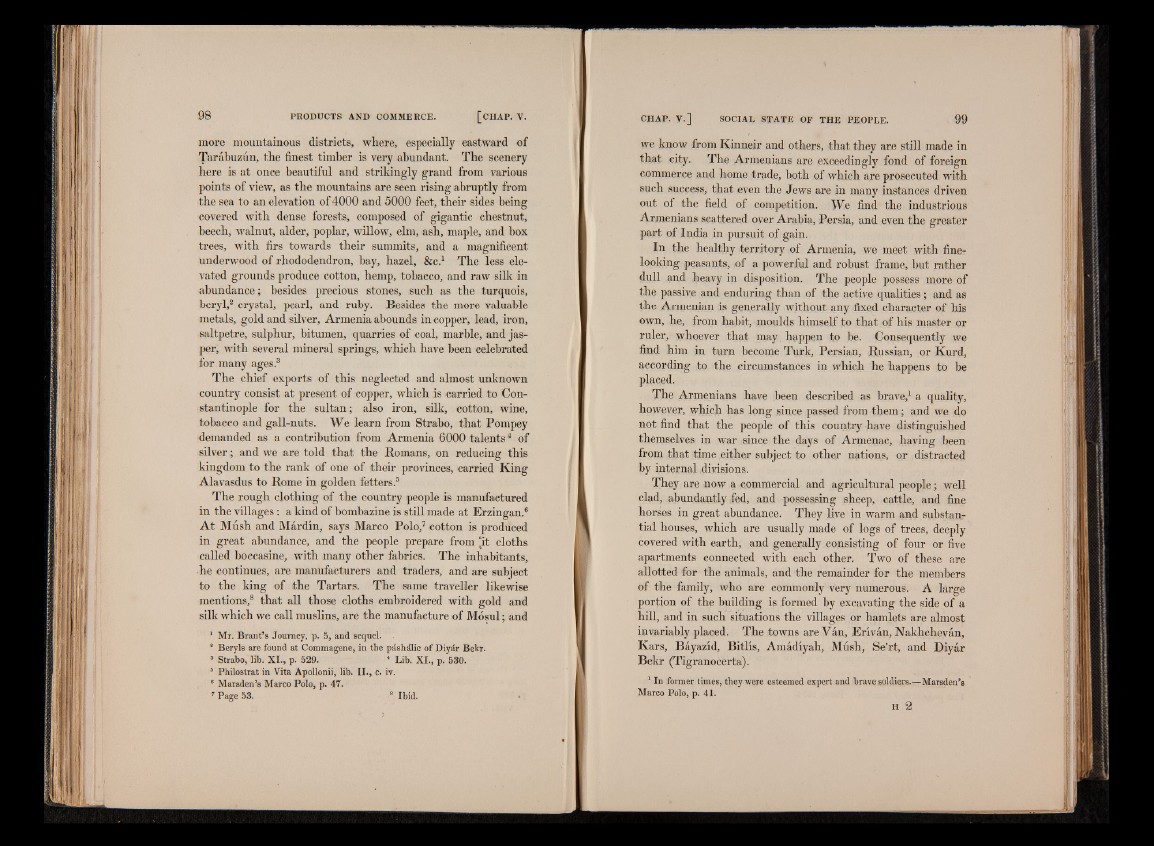
more mountainous districts, where, especially eastward of
Tarabuzun, the finest timber is very abundant. The scenery
here is at once beautiful and strikingly grand from various
points of view, as the mountains are seen rising abruptly from
the sea to an elevation of4000 and 5000 feet, their sides being
covered with dense forests, composed of gigantic chestnut,
beech, walnut, alder, poplar, willow, elm, ash, maple, and box
trees, with firs towards their summits, and a magnificent
underwood of rhododendron, bay, hazel, &C.1 The less elevated
grounds produce cotton, hemp, tobacco, and raw silk in
abundance; besides precious stones, such as the turquois,
beryl,2 crystal, pearl, and ruby. Besides the more valuable
metals, gold and silver, Armenia abounds in copper, lead, iron,
saltpetre, sulphur, bitumen, quarries of coal, marble, and jasper,
with several mineral springs, which have been celebrated
for many ages.3
The chief exports of this neglected and almost unknown
country consist at present of copper, which is carried to Constantinople
for the sultan; also iron, silk, cotton, wine,
tobacco and gall-nuts. We learn from Strabo, that Pompey
demanded as a contribution from Armenia 6000 talents4 of
silver; and we are told that the Romans, on reducing this
kingdom to the rank of one of their provinces, carried King
Alavasdus to Rome in golden fetters.6
The rough clothing of the country people is manufactured
in the villages: a kind of bombazine is still made at Erzingan.6
At Mush and Mardin, says Marco Polo,7 cotton is produced
in great abundance, and the people prepare from ‘it cloths
called boccasine, with many other fabrics. The inhabitants,
he continues, are manufacturers and traders, and are subject
to the king of the Tartars. The same traveller likewise
mentions,8 that all those cloths embroidered with gold and
silk which we call muslins, are the manufacture of Mosul; and
1 Mr. Brant’s Journey, p. 5, and sequel.
8 Beryls are found at Commagene, in the pdshdlic of Diydr Bekr.
8 Strabo, lib. XI., p. 529. 4 Lib. XI., p. 530.
5 Philostrat in Vita Apollonii, lib. II., c. iv.
8 Marsden’s Marco Polo, p. 47.
7 Page 53. 8 Ibid.
we know from Kinneir and others, that they are still made in
that city. The Armenians are exceedingly fond of foreign
commerce and home trade, both of which are prosecuted with
such success, that even the Jews are in many instances driven
out of the field of competition. We find the industrious
Armenians scattered oyer Arabia, Persia, and even the greater
part of India in pursuit of gain.
In the healthy territory of Armenia, we meet with finer
looking peasants, of a powerful and robust frame, but rather
dull and heavy in disposition. The people possess more of
the passive and enduring than of the active qualities; and as
the Armenian is generally without any fixed character of his
own, he, from habit, moulds himself to that of his master or
ruler, whoever that may happen to be. Consequently we
find him in turn become Turk, Persian, Russian, or Kurd,
according to the circumstances in which he happens to be
placed.
The Armenians have been described as brave,1 a quality,
however, which has long since passed from them; and we do
not find that the people of this country have distinguished
themselves in war since the days of Armenac, having been
from that time either subject to other nations, or distracted
by internal divisions.
They are now a commercial and agricultural people; well
clad, abundantly fed, and possessing sheep, cattle, and fine
horses in great abundance. They live in warm and substantial
houses, which are usually made of logs of trees, deeply
covered with earth; and generally consisting of four or five
apartments connected with each other. Two of these are
allotted for the animals, and the remainder for the members
of the family, who are commonly very numerous. A large
portion of the building is formed by excavating the side of a
hill, and in such situations the villages or hamlets are almost
invariably placed. The towns are Van, Erivan, Nakhchevan,
Kars, Bayazid, Bitlis, Amadiyah, Mush, Se’rt, and Diyar
Bekr (Tigranocerta).
1 In former times, they were esteemed expert and brave soldiers.—Marsden’s
Marco Polo, p. 41.
H 2